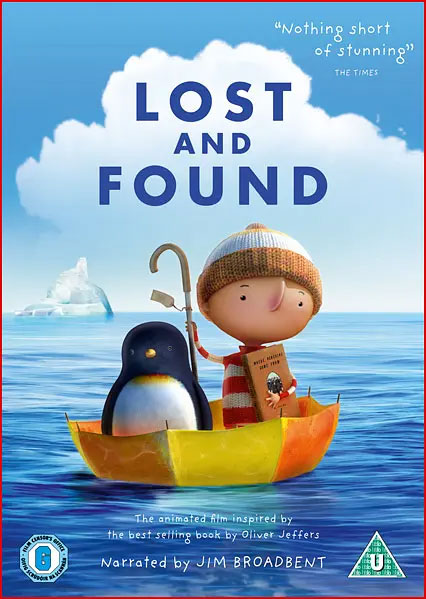Film Name: 远在天边 / Lost and Found

In the animation gallery at Studio AKA, I showcased works from the UK’s AKA studio. Many netizens expressed particular interest in “Lost and Found.” Unfortunately, the film isn’t available for download online. However, I will present the full version to visiting anime enthusiasts at the film screening event organized by Wuyou. Stay tuned to the Inside Bar—Anime Branch for specific timing details.
“Lost and Found” tells a story of loss and reunion. The title itself refers to the lost and found office—where people deposit found items or search for lost belongings. The film’s protagonist, troubled by a penguin constantly following him, once visited the lost and found office but failed to locate the penguin’s owner. So he decides to return the little penguin to Antarctica.
Many may have anticipated the ending—surely the boy and penguin will stay together, for how else could it be called “lost and found”? Yet this film’s strength lies in its slow, deliberate pacing, rich with meticulous detail. This builds such powerful emotional resonance that the final reunion is utterly moving, impossible not to be touched and brought to tears. This is a film that lingers in the mind long after viewing—a truly heartfelt and moving work.
I watched it with an animation teacher, who remarked afterward: “This film carries profound educational value. It instills in children the concept of self-reliance.” Indeed, the young boy independently researches penguin habitats at the library, locates Antarctica on a map, builds his own boat, and rows across the ocean with the baby penguin. Yet to reduce the film’s “educational” value to merely teaching children self-reliance would be to miss its core message entirely. In truth, both the absence of the boy’s parents and family, and the portrayal of his self-reliance, serve to emphasize the interaction between the boy and the penguin. It’s a way to make their friendship feel more pure.
A classic angle on the theme of “losing and regaining” is that sometimes you only truly appreciate the value and meaning of something when you lose it. “Loss” implies a cost. When what is gained differs from what is lost—that is, when the lost item is irreplaceable—the film takes on a fatalistic tone, revealing a distinctly adult perspective. Conversely, when what is gained is identical to what was lost—that is, when the lost item returns—the film takes on a fairy-tale quality, leaning more toward a childlike sensibility. This film clearly belongs to the latter category.
I won’t spoil any more here. Just want to point out a few things:
First, this work is adapted from Oliver Jeffers’ picture book of the same name. How to transform the two-dimensional characters from the book into three-dimensional ones required careful consideration. I believe there are at least two bold changes: one is the treatment of the neck. In the picture book, the little boy has no neck. This is because highly abstract picture books discard any redundant information. However, for animated characters, the level of abstraction isn’t as high as in a picture book, and it’s also necessary to incorporate appropriate head movements for the little boy, so a neck is essential. The second is the treatment of the eyes. In the book, both the boy and the penguin have needle-like eyes—two small black dots. This is characteristic of a European comic style where facial expressions are primarily conveyed through the lines of the mouth. In the animation, however, the boy and penguin’s eyes become small black beans. They can blink, change shape, and even have eyebrows, giving them the ability to express emotions.
Second, the film features several symbolic props worthy of analysis. Examples include the toy rubber duck and the deep-sea octopus, among others. I won’t elaborate further here.
Third, the film’s build-up to the penguin taking the photograph, coupled with the montage technique employed when the boy discovers the image, stands out as one of its most brilliant moments. Naturally, the final reunion scene is also incredibly tense.
In summary, this is an exceptionally fine standalone animated feature. Each viewing leaves me feeling profoundly moved.
Please specify:Anime Phone Cases » Lost and Found 2008 Animation Film Review: The Significance of Regaining What Was Lost